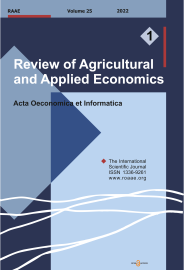KEYWORDS:
conventional cocoa; organic cocoa; fractional regression; scale efficiency; selection-bias
DOI NUMBER:
10.15414/raae.2020.23.02.112-123
ABSTRACT:
Research background: Despite the growing social recognition of the positive role played by organic farming in the conservation of natural resources and the reduction or elimination of the negative externalities of modern agriculture, the economic competitiveness of organic versus conventional agriculture is a contentious issue. Studies on scale efficiency in the agricultural economics literature, in general, did not address the differences in production practices such as organic and conventional production.Purpose of the article: We estimated scale efficiency of organic and conventional production, tested for differences between organic and conventional agriculture scale efficiency, and explored the sources of inefficiencies.
Methods: This was accomplished using cross-sectional data on 658 organic and conventional cocoa farmers, for the 2012/13 production season in the Eastern Region of Ghana. The analysis accounted for selection bias and recognised the fractional property of the scale efficiency measure.
Findings & Value added: Organic agriculture is less scale efficient than conventional agriculture. Whilst we recommend that both producer groups improve scale efficiency, organic producers require greater work to do to make up for the almost 50% scale inefficiency. We also found farmer-based organisations to significantly influence scale efficiency. This calls for the need to strengthen farmer-based organisations to increase participation, among other reasons. We departed from the existing scale efficiency literature in a three of ways. We accounted for selection-bias using propensity score matching in the organic and conventional samples in analysing scale efficiency, modelled scale inefficiency using fractional regression and empirically selected the appropriate link function using a battery of tests. Finally, we accounted for an important policy variable; farmer-based organisation. We employed propensity score matching that accounted from observable biases. Further research may consider other methods that account for both observed and unobserved variations.
Please Cite this Article as:
Justice Gameli DJOKOTO, Victor OWUSU, Dadson AWUNYO-VITOR (2020) Is Organic Agriculture More Scale Efficient Than Conventional Agriculture? The Case Of Cocoa Cultivation In Ghana. Review of Agricultural and Applied Economics. XXIII (Number 2, 2020): 112-123. doi: 10.15414/raae.2020.23.02.112-123
URL for sharing:
https://roaae.org/1336-9261/doi/abs/10.15414/raae.2020.23.02.112-123
FULL TEXT PDF:
▼ direct download link| view online in fullscreen ▲
References:
▼ direct download link

